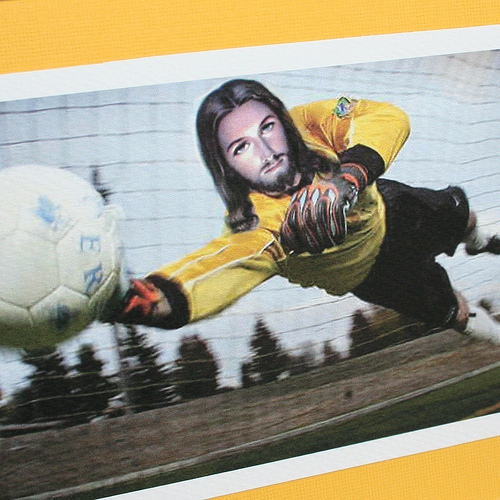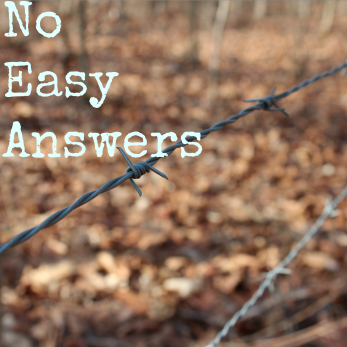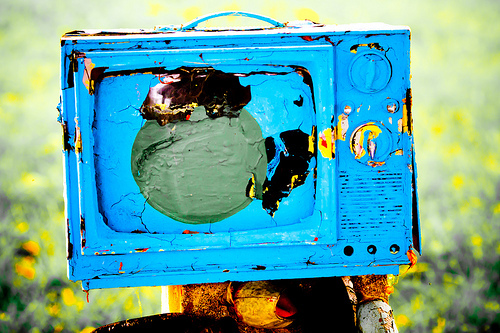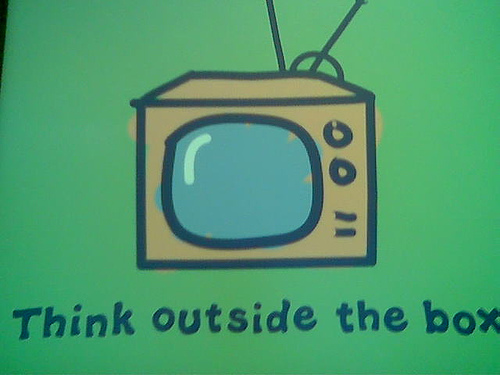Kathleen M. Basi's Blog, page 40
July 15, 2015
Making Jesus Real
When you’re a kid, you take everything you hear at face value, even when things seem to contradict each other. But as you grow, the things that don’t add up can really lead to a crisis of faith.
Enter the study of the “historical Jesus.”

How Jesus has always seemed to me: really distant, if glorious and inspiring. Image by angelofsweetbitter2009, via Flickr
I’ve been intrigued by this branch of Christian scholarship for quite a while, but I thought its usefulness was limited to distinguishing what we can prove really happened, as opposed to the stuff we have to take on faith.
As I’ve been reading historical Jesus books, though, certain things have become clear. First of all, historians hold widely divergent views as to what the historical facts are, let alone what they mean. I’ve read from several different perspectives now: liberal, conservative, populist, and Jewish.

How Jesus probably views our attempts to turn him into a revolutionary/reactionary/Republican/Democrat/fill-in-the-blank. Image by tonystl, via Flickr
But the resource that seems widely regarded as the quintessential source is A Marginal Jew, by John P. Meier. Four volumes, each one a monolith: a thousand pages each, in language so scholarly I have to keep running to look up words. The kind of book where the footnotes often take more verbiage than the text.
I embarked on this series with guarded expectations. I usually find scholarly writing unnecessarily hard to understand. And indeed, as I wade, slowly, through the deep and murky waters of the historical Jesus, I find sections of the book that really aren’t any help to me at all.
But in between–wow. In between.
We live in a culture that is permeated by the idea that faith = Bible = religion, a closed loop in which those words can be used interchangeably. As a Catholic I don’t buy into that idea–for one thing, the Bible came into being after the Church, not before it. Who compiled the thing, do you think? The Bible is a Tradition, just like Mary and apostolic succession. (Yeah, I know. Them’s fightin’ words. But true nonetheless.)
Even I, as a Catholic, however, have felt constrained by the need to stay within the bounds of the Bible to get to know Jesus. And there’s a problem with that, because there’s an awful lot that’s not in the Bible. And a lot of what is in the Bible doesn’t really make sense. If you try to to interpret it based solely on itself, you often end up, as I have, seeing Jesus as deliberately obtuse, quarrelsome, and generally a pain in the butt.
Things are missing. Things that are really important to making sense of it.

Probably this is not one of the things missing from the Bible. But I feel pretty sure Jesus would giggle if he saw it. Photo by chris m./ rzrxtion (pronounced resurrection), via Flickr
Those things weren’t missing when the Church was young. The people hearing the stories about Jesus knew the cultural context. They understood plays on words and inside jokes that have been lost to us through translations and cultural shifts.
Plus, nobody was trying to write down every detail. These were collections of stories told by the apostles and recorded somehow, eventually, but without the ability to ask questions and clarify. The New Testament is the Cliff Notes version of Jesus’ life and ministry.
The reality is we’re never going to get the whole story, but what Meier’s book is doing for me is peeling back some of those layers of nuance to reveal things I never would have caught otherwise.
In volume 2, for instance, Meier goes through a detailed analysis of Jesus’ sayings about John the Baptist. I can’t possibly do justice to this sequence, but what floored me about it was the idea that a) Jesus probably spent some time as a member of John’s ministerial band, b) when Jesus struck out on his own, he kept some of John’s themes but diverged enough that it unsettled John’s disciples as well as John himself; hence, “So…are you The One, or not?”, and c) some of the things Jesus said about John might well have been a challenge to John to say, “You’ve had your vision of God, and now I’m challenging you to grow in it. Can you be open to changing your heart?”
Quite a thing to tell John the Baptist!
There is humor buried in those passages. Jesus wasn’t obtuse, he was charismatic. Which we should have been able to assume, because someone obtuse and quarrelsome wouldn’t have attracted a following. But when you rely on the Bible alone, you’re not allowed to make those leaps.
For years, I’ve feared that most of what was in the Bible was a synthesis and creation of the early Church, without a whole lot of basis in what Jesus actually said. (Especially given the ponderous speeches he makes in the Gospel of John. I really don’t like Jesus in the Gospel of John. I want to smack him. Which is also how I feel about Paul virtually all the time.)It is liberating and affirming to have someone pull apart the threads in a rational, scholarly way, and finding that many, if not most, things have roots in historical sayings. And the process of separating the origins from the synthesis requires that we talk about the social and cultural context—which sheds a brilliant light on Jesus.
As one who has always felt distant from Jesus, more in tune with the Holy Spirit, I’m finding it a real faith booster. And so I share it with you.


July 13, 2015
The Trouble With “The” (A No Easy Answers Post)
 The timing seemed a little ironic.
The timing seemed a little ironic.
An old post, called “Words Matter: A Disability Primer,” was in the process of sending my blog views through the roof, and where was I? I was sitting in a ballroom listening to a priest share a piece of advice he was given when beginning a challenging urban assignment:
“Lose the word ‘the.’”
Not the homeless, the poor, the mentally ill. Because that terminology is a label that builds walls. Just as calling someone a “Downs kid” reduces them to their disability, referring to the homeless or the mentally ill reduces people to whatever struggle they face. It makes them “Those People,” which is to say, “Not Like Me.”
I am 100% guilty of this.
It’s easier to deal with the things that make us uncomfortable when we can compartmentalize them. We can all sympathize with Those People as long as They are kept at a distance. As long as all it requires is to feel sympathy and maybe toss some money at the problem.
Except there’s this inconvenient, deeply convicting truth I once heard, and which has stuck with me ever since: The Homeless are not a problem to be solved, but people to be loved. You can substitute any number of other troublesome issues and the same is true.
Love is not practiced at a distance.
Love is practiced person to person, eyes meeting eyes and hands meeting hands. Which adds additional inconvenient truths, because when you get to know someone it’s a whole lot harder to pass judgment on them.
The next morning, as I ran by the river beside the hotel, I passed at least three people who had clearly slept under viaducts. It was hard for me not to examine my own conscience.
Because this call to love is a nightmare for an introvert. It’s hard enough for me to walk into a gathering of church musicians, people who have similar training and interests and passions, and get to know people. To try to bridge the chasm between me and people whose life experiences and choices and circumstances have landed them in a place so far removed from mine? I can only say again: nightmare.
Now, here’s my problem. There are good things in the world, and the fact that suffering exists elsewhere does not render those good things bad. They’re still good.
But we live lives so insulated from the suffering, we don’t even recognize our own sense of entitlement anymore. I’m dancing at Jazzercise to music performed by people who have millions of dollars to throw at nothing, and I count myself more righteous because I don’t throw money at nothing. Except, well, Jazzercise.
I mean, think about the way we live. We have so much wealth that we hold eating contests where a person wins by consuming ten thousand calories’ worth of hot dogs in ten minutes. Five days’ worth of calories. For a Westerner. For someone in the developing world? Maybe a week and a half’s worth of food. In ten minutes.
The candy store sells fudge only by the slice, a slice so big that six of us could eat from it twice. The portion sizes at restaurants everywhere are so big that Christian and I can split one between us and count it as more than a full meal.
And because we consider this “normal,” we have to pay even more money to go to exercise classes and tuck our tummies and buy weight loss supplements.
And upon this sort of attitude does our entire economy hinge.
I can’t escape the conclusion that we’re all, collectively—even the most aware and convicted among us—completely, sinfully clueless. The “consumer culture” that Pope Francis took to task in Laudato Si is something that every one of us participates in. And those of us who profess to be Christians should be really uncomfortable with that.
I don’t know where to draw the line between a healthy enjoyment of the goodness of modern life—$100 hotel robes, king-sized beds, Wii and weekend getaways—and sinful cluelessness.
But maybe that’s all right. We, the comfortable, need to be afflicted sometimes, because we need to be shaken awake every so often and realize there’s a bigger world out there and we have a responsibility to it. Even if there aren’t any clear cut solutions.


July 10, 2015
Random Thoughts On Pop Culture
We were sitting in front of the TV one night when a Liberty Mutual commercial came up. “We’ll buy you a car ONE YEAR NEWER than your current car, with ONE THOUSAND MILES!” they boasted.
I elbowed Christian. “Whaddya think, Christian?”
He nodded slowly. “Hm,” he said. “That means we could get a truck that’s nineteen years old, with a hundred and ninety-nine thousand miles on it.”
(Note: We misheard. It’s only new cars that get this deal.)

Photo by 00dann, via Flickr
We both laughed, but it got me thinking how many other ridiculous things are in the air around us that we don’t even notice. Like these:
No one who has sex in the movies ever has that “fourth arm” problem.
Nobody ever gets a raw face from making out the guy who thinks he looks so cool when he fails to shave.
Then there’s the compulsion to drop all connecting words. “Recipe” style. I mean, yes, when you read a recipe it says “Add flour, sugar, and salt; stir.” But in spoken speech, you always fill in the words. So why is it that Siri (and other GPS directions) do it. Radio news guys do it, reading their material like headlines, only using a tone of voice like normal speech. Since when did American culture begin to aspire to the level of a robotic voice?

Photo by Jenn and Tony Bot, via Flickr
Singers surely, surely do not use that strained, self-aware, “I’m-so-cool” voice when they’re singing a) in church, b) happy birthday, or c) a lullaby to their kids. So what do their REAL voices sound like? (I’m looking at you, Demi Lovato, Megan Trainor.)
And male pop stars: WHAT is with that annoying, whiny FALSETTO???? (Not to name names, Adam Levine-and-Justin-Timberlake-give-me-the-heebie-jeebies.)
Speaking of unnatural voice patterns, what’s up with the radio deejays who give the…weather and the local…news while…deliberately breathing…in the wrong…place in the…sentence? Maybe you think it makes you sound distinct, but you must drive non-native English speakers completely batty. Don’t you think they have enough trouble following? Have a little compassion and break your…sentences in a…place that makes…logical sense. Pretty please?
Has there ever been a helicopter in a movie that did NOT blow up?
What things strike you as weird in popular culture?


July 8, 2015
The “What Other People Think” Problem
We buried my grandmother last week.
She’s been gone a year and a half already, but she donated her body to science, so the ashes just arrived recently, and Mom arranged to have the parish priest come out to the Catholic cemetery and meet the family to finally lay her earthly remains to rest—a short, simple rite.
After Father left, the family examined my grandparents’ grave marker and those around it, most of which belonged to my great-uncles, my great-grandparents, my great-grandparents. Reaquainting us with who was connect to whom, and how. Trying to decipher nineteenth-century markers, which had only initials, not even any dates, and figure out to whom they belong.
In the meantime, my boys were sitting on headstones.
(There was also some Darth Vader spaceship-game playing on my grandparents’ grave. Some kneeling down at the edge of Grandma’s hole and peering down at the small white vault. Some hide-and-seek among the graves.)
See, I have a problem as a parent. I have four kids, close together, and the reality is that if they’re not hurting anything or anyone, I’m inclined to let them do what they’re doing. There are about a million battles more worth fighting than “that’s sacreligious! That’s disrespectful! What will people think?”
Because that last one, after all, is the real issue. The people buried beneath those graves ceased to care long ago. In fact, my guess is that if they have any reaction to my boys sitting on their faces, it would be to chuckle.
And yet I spent an agonizing minute or two trying to decide whether I needed to scold them and make them “behave,” because if I didn’t, someone might judge me for my parenting (or lack thereof).
This is a daily, thrice-daily, occurrence in my world. At least in my own home I only have to consult my own judgment…well, mine and that of my husband—he’s a bit more traditional in his opinions of what kids should and should not be allowed to do. But any time we’re in public, more of my brain is occupied by what other people might think of my parenting than is actually focused on parenting my kids.
I think I need to work on this.
I don’t care for all those stereotypes about birth order, because the families I grew up with didn’t match up very well with those tropes. Well, except for the part where the middle child (that’s me) hates conflict and deals with it badly, going so far as to suppress her own reactions in order to keep the peace, until she gets pushed just that one time beyond her capacity not to react, and then…well, you get the idea.
This is one of those areas in my life where I’m so worried about pleasing everyone else…or maybe just about trying not to get in trouble myself…that I end up causing myself more trouble than if I just had the courage of my own convictions.
Because you know what? It really doesn’t matter if my kids play air guitar at church. I’m quite sure God loves their enthusiasm.
It really doesn’t matter if they climb up the slide, at least as long as nobody’s trying to come down it. Or up the outside of the tube slide, for that matter.
It really doesn’t matter if they crawl under the table at a restaurant.
It really doesn’t matter if they play weird vocal games that we find annoying.
We spend so much time as adults trying to make kids stop acting like kids. Trying to make them act like adults, and failing to honor what makes them unique, and what that gift has to offer us.
And I think it’s time that I, for one, start embracing it instead of battling it.


July 6, 2015
A Visit With Barbara Claypole White, author of THE PERFECT SON (with giveaway!)
On Friday, I shared my review of Barbara Claypole White’s book, THE PERFECT SON. Today Barbara has graciously agreed to a Q & A.–and a giveaway! Use the combox to ask a question or post a comment and you can be entered to win a copy of the book!
Barbara, tell us a bit about about THE PERFECT SON.
THE PERFECT SON  is the story of a high maintenance family struggling with forces threatening to rip it apart. My family is a high maintenance family—my son has obsessive-compulsive disorder (OCD)—and I used to say it felt as if our family were balanced on a high wire: one wobble, and we’d all come crashing down.
is the story of a high maintenance family struggling with forces threatening to rip it apart. My family is a high maintenance family—my son has obsessive-compulsive disorder (OCD)—and I used to say it felt as if our family were balanced on a high wire: one wobble, and we’d all come crashing down.
When I created the Fitzwilliam family—Ella, the full-time mom and family rock; Felix, the emotionally disengaged breadwinner; and Harry, the chaotic teen with a soup of issues that includes ADHD and Tourette’s—I did more than wobble their world. I torpedoed it. In the first chapter, Ella has a major heart attack at 47, on a plane coming in to the Raleigh-Durham International Airport. (Interesting aside: this story seed started two years ago when some poor guy collapsed in front of me on a transatlantic flight…approaching RDU.)
Ella’s emotional arc, learning to let go and trust that her special-needs son could cope without her constant guidance, echoes my own journey. On the flip side is Felix, a man obsessed with order, routine, and perfection, a parent who has to learn the opposite—how to engage with his son. Harry, bless him, is always Harry. He’s confident and filled with a sparky joie de vive that gives him more energy than a nuclear power plant. Or, as his best friend Max says, a howler monkey on meth. Max epitomizes one of my favorite themes of the book: that you can’t judge people by one aspect of their personalities. Max looks like a delinquent punk rocker, and sometimes he deliberately acts like one. He’s actually a math genius and a devoted big brother to autistic Dylan. And then there’s Eudora, the Fitzwilliam’s 75-year-old neighbor, a southern horticulturalist with a voice as sweet as strychnine.
It’s almost a given that “women’s fiction” is fiction for and about women. And yet in this book, the focus is on the men loved by one woman, Ella. What made you choose that structure?
It wasn’t a conscious decision. I created the first three chapters for my contract proposal, polished the heck out of them, and wasn’t really sure what happened next. Felix’s journey held the most appeal for me, so I zoomed in on him. Ever since I created James Nealy, my beloved hero with OCD in THE UNFINISHED GARDEN, I’ve wanted to go deeper and darker. That desire led to Felix. Interestingly enough, I’ve been on a riff of writing damaged men, but for novel four, I have a damaged heroine.
Can’t wait! On that topic of “damaged” heroes/heroines: all your books address characters who are dealing with neurological disorders or mental illnesses. What is it about this dynamic that inspires you as a storyteller?
I’m drawn to quirky characters and people with dark corners. They have such potential to shine and show true courage through doing things that most of us take for granted. We talk about the courage of soldiers, policemen, teachers, nurses, etc., as we should, but we rarely talk about the courage it takes to make it through one ordinary day when you’re fighting a private war no one else can share. In THE UNFINISHED GARDEN, James faces his crippling fear of flying for the woman he loves. I cheered through that moment and wanted to write more of them.
I love that: the courage to make it through an ordinary day. Just beautiful! Your writing just glows with hope, which is especially profound given that your characters struggle with conditions that are never going to go away. There’s no magic bullet, no “the strife is o’er” moment to end your books; the struggles faced by your characters are going to continue for the rest of their lives. Is that focus on hope, even when things aren’t perfect, something you consciously aspire to in your writing?
Oh, yes! There aren’t many happy endings in the world of mental illness. Mental illness, after all, is treatable, not curable, and often fatal. It needs to be managed like any other life-threatening disease. But there’s always hope for a better tomorrow. Those of us in the trenches need that hope. It’s also the reason I have a recurring image in my writing of light through the trees.
This novel seems to have just exploded on the scene. What do you think it is about this story that seems to resonate so deeply with people?
 Thank you. Since it was chosen for the Kindle First Program in America, England, and Australia, THE PERFECT SON has been exposed to more readers than I could possibly have imagined. Kindle First is a promotion that allows Amazon readers to access tomorrow’s releases a month early, and it’s the reason THE PERFECT SON has been #1 in three categories of Kindle sales throughout the month of June, and the reason I’ve shot into the top twenty most popular authors on Amazon. The book was also selected for placement in over 5,000 Walmart stores, and over 350 Sam’s Club stores. Because I’m darkly quirky—and some of my characters occasionally use the F bomb—I’m not everyone’s cup of tea, and I’m fine with that. Reading is subjective, and I’ve found my niche as a writer. So yes, I’ve been quite surprised by the reception the novel has received, but my editor would give a different answer. She would say the book has mass appeal, which is what she believed when she first saw it in manuscript form. While this is a story about Tourette’s and undiagnosed mental illness, it also strips down to a story of a family in crisis. And we’ve all been there.
Thank you. Since it was chosen for the Kindle First Program in America, England, and Australia, THE PERFECT SON has been exposed to more readers than I could possibly have imagined. Kindle First is a promotion that allows Amazon readers to access tomorrow’s releases a month early, and it’s the reason THE PERFECT SON has been #1 in three categories of Kindle sales throughout the month of June, and the reason I’ve shot into the top twenty most popular authors on Amazon. The book was also selected for placement in over 5,000 Walmart stores, and over 350 Sam’s Club stores. Because I’m darkly quirky—and some of my characters occasionally use the F bomb—I’m not everyone’s cup of tea, and I’m fine with that. Reading is subjective, and I’ve found my niche as a writer. So yes, I’ve been quite surprised by the reception the novel has received, but my editor would give a different answer. She would say the book has mass appeal, which is what she believed when she first saw it in manuscript form. While this is a story about Tourette’s and undiagnosed mental illness, it also strips down to a story of a family in crisis. And we’ve all been there.
Your previous books, THE UNFINISHED GARDEN and THE IN-BETWEEN HOUR, tell stories of healing found through romantic relationships. With THE PERFECT SON you focus on redemption through the strengthening of a father-son bond. What made you shift your focus? Is this an underdeveloped theme in literature?
To be honest, I find the father-son dynamic far more interesting than the mother-daughter one. I’m fascinated by the inner lives of men. Men aren’t emotional in the same way as women, and much remains hidden and unexpressed. And yet the gift—or the curse—of mental illness is often extreme sensitivity. I’ve found that again and again in my research, and I can say with certainty that my son is very empathetic. He’s an emotional sponge…
You’ve managed to create a page-turner without car chases and explosions. Your fiction is intensely character-driven, and you have a real knack for making us care about your characters. Thanks for taking the time to visit today! Where can we find copies of your book?
Thank you! The book is available through Amazon, Barnes & Noble, IndieBound, Books-A-Million, and, of course, Walmart and Sam’s Club.


July 3, 2015
Book Review: THE PERFECT SON
 This year I’ve been volunteering with the Women’s Fiction Writers Association as a host for the “women’s fiction cafe,” which is done on Facebook. Instead of asking everyone to read a book in advance and discuss it, this is a chance for authors to stop in and give people a taste of the book, its themes and locales and inspiration, which (we hope) will make people want to read it.
This year I’ve been volunteering with the Women’s Fiction Writers Association as a host for the “women’s fiction cafe,” which is done on Facebook. Instead of asking everyone to read a book in advance and discuss it, this is a chance for authors to stop in and give people a taste of the book, its themes and locales and inspiration, which (we hope) will make people want to read it.
(By the way, if you’re interested in learning about new books through this format leave me a comment so I can be sure to invite you to the cafe weeks! Click here for next week’s!)
The first author I worked with was the lovely and ebullient Barbara Claypole White, whose enthusiasm endeared her to me, as did her flawed but lovable characters.
Barbara has a new book available now: THE PERFECT SON, and I’m pleased to say that it’s my favorite of her books so far. Here’s my Goodreads review:
Haunted by memory of his abusive father, Felix Fitzwilliam has always held himself at a distance from his teenage son, Harry, who, although brilliant, struggles with Tourette’s and other neurological challenges. But in the wake of his wife Ella’s heart attack, Felix has to take over as primary parent. Lyrical and filled with hope, THE PERFECT SON is the story of these two men learning to trust each other enough to admit their weaknesses and grow together as men.
It’s an unspoken assumption that “women’s fiction” must be about women. Barbara Claypole White expands that definition to encompass the story of two men loved by a woman. Felix and Harry are deeply and realistically flawed characters, and I spent every page holding my breath, hoping they would live up to their potential for good. Sometimes they didn’t. But their love and their commitment to their family and each other always brought them back. To watch them grow as human beings gave me hope for humanity. That is what this author does so well: writing stories of hope in situations where too often in reality we see only pain or hardship. This is her third book and my favorite so far.
Monday, Barbara will visit us for a Q&A. She’s such an interesting lady, and extremely personable, so I hope you’ll stop by!


July 1, 2015
the Great god, “Screen Time”

Photo by Thomas Hawk, via Flickr
I once expressed to my mom what jerks my kids are after they’ve had screen time. It’s so weird. They get up from that favorite time and they’re whiny, uncooperative, quarrelsome, and generally not fun to be around.
Mom said, “I know. That’s why I stopped letting you girls watch Saturday morning cartoons, you know.”
I did not know.
In fact, in light of what we went through last week in our house, that nugget of information illuminated a great deal about how my sisters and I behaved growing up.
Raise your hand if you identify with me on this: I’ve always tried to avoid screen time as a consequence of bad behavior, because I think it’s more of a punishment for me than for the kids. Because when they’re staring at a screen, they take care of themselves.
But last week, I’d had enough. I took away the kids’ screen time for a week.
On Day One, I held my breath, but a single reminder of their transgressions made them subside. Even Julianna and Michael.
By Day Three, they were playing with kites, Legos, and a deck of cards.
By Day Five, I was thinking this was the best thing I’d ever done.
By Day Seven, I was trying to figure out how to make it permanent without being a jerk.
The behavior in our house is by no means ideal. There’s still a crazy amount of ear-piercing shrieks, tug-of-wars over dollies and balloons, and tattling-while-ignoring-my-own-duties. My three-year-old’s legs still fold themselves to the floor in the most dramatic collapse you’ve ever seen; Alex still growls through his teeth and shakes his brother; Julianna still wails when crossed; and I still shout, “WHATDIDIJUSTTELLYOUTODOANDWHYAREYOUNOTDOINGIT??????”
But.

Photo by debaird™, via Flickr
For one week, I didn’t have to arbitrate who gets the Wii and who gets the iPad. For one week, they actually did the cleaning instead of asking repeatedly, “When I’m done can I have a movie?”
Until this week, I hadn’t realized that somehow, our life has become structured around screen time. I can make two dozen rules about what happens before a child gets his or her movie. But the fact is, it’s still the structural foundation of everything. We have to figure out how to plan the day to make sure there’s time for the great god Screen Time—even if half a dozen other things are done poorly or not at all as a result.
And I’ve felt guilty if they don’t get their screen time. Like I’m somehow depriving them.
This has been a very illuminating week for me. And my children are not going to like the result. But I think I’m going to like it very much.
There’s a very important series of guidelines in our natural family planning classes. They’re called the Phase I guidelines, to help couples plan their intimate activities. I won’t go into detail beyond this: these guidelines are designed to help you be confident that any signs you’re observing are related to fertility and not to sexual intercourse. The Phase I are:
Evenings Only.
Not on consecutive days.
If “dry”.*
I am instituting Phase One guidelines for screen time in our house. In order to get screen time, kids will have to be fighting-free from rising to bedtime for one full day. If they continue to get along the second day, they can have screen time after school. And the next morning begins another day of abstinence, while we make sure we’re still fighting-free.
We’ll see how this goes. I have high hopes.
*Disclaimer: If you try to practice natural family planning using these three rules without instruction, you deserve to get pregnant. And don’t blame NFP.*


June 29, 2015
Why was I excited for the papal encyclical? The challenge of Laudato Si (Reblog)
I’ve been following blogger Margaret Felice for quite some time, and when I read the following post late last week, I felt as if it was written just for me. I admit I have not had time to dig into Laudato Si yet, but I officially downloaded it onto my computer for an upcoming road trip. In the meantime, I give you Margaret:
The first point at which I thought the Pope might be laughing at me was paragraph 55.
55. Some countries are gradually making significant progress, developing more effective controls and working to combat corruption. People may well have a growing ecological sensitivity but it has not succeeded in changing their harmful habits of consumption which, rather than decreasing, appear to be growing all the more. A simple example is the increasing use and power of air-conditioning. The markets, which immediately benefit from sales, stimulate ever greater demand. An outsider looking at our world would be amazed at such behaviour, which at times appears self-destructive.
I can almost see him writing “smh” in the margin, shaking his zuchettoed head. Those Americans and their air-conditioning.
 There was no air conditioner going in our house on the morning the encyclical dropped, but I was basking in the breeze of our overhead fans as I scrutinized the document Thursday morning. I hunched over my laptop until moments before I had to leave for an appointment, ignoring my husband (except when he brought me an english muffin, God bless him) and ignoring my visiting brother (except to show him where the eggs and frying pan were – breakfast is an important thing in our house). I was so excited to read Laudato Si.
There was no air conditioner going in our house on the morning the encyclical dropped, but I was basking in the breeze of our overhead fans as I scrutinized the document Thursday morning. I hunched over my laptop until moments before I had to leave for an appointment, ignoring my husband (except when he brought me an english muffin, God bless him) and ignoring my visiting brother (except to show him where the eggs and frying pan were – breakfast is an important thing in our house). I was so excited to read Laudato Si.
I should admit, I was expecting my lifelong environmentalism to be vindicated, and it was. And if I’m being honest, I should admit what I was not expecting: to also be admonished. I suppose I knew dispassionately that such criticism was likely, but it still stung when it came.
111. Ecological culture cannot be reduced to a series of urgent and partial responses to the immediate problems of pollution, environmental decay and the depletion of natural resources. There needs to be a distinctive way of looking at things, a way of thinking, policies, an educational programme, a lifestyle and a spirituality which together generate resistance to the assault of the technocratic paradigm. Otherwise, even the best ecological initiatives can find themselves caught up in the same globalized logic. To seek only a technical remedy to each environmental problem which comes up is to separate what is in reality interconnected and to mask the true and deepest problems of the global system.
203. Since the market tends to promote extreme consumerism in an effort to sell its products, people can easily get caught up in a whirlwind of needless buying and spending. Compulsive consumerism is one example of how the techno-economic paradigm affects individuals. Romano Guardini had already foreseen this: “The gadgets and technics forced upon him by the patterns of machine production and of abstract planning mass man accepts quite simply; they are the forms of life itself. To either a greater or lesser degree mass man is convinced that his conformity is both reasonable and just”.[144] This paradigm leads people to believe that they are free as long as they have the supposed freedom to consume. But those really free are the minority who wield economic and financial power. Amid this confusion, postmodern humanity has not yet achieved a new self-awareness capable of offering guidance and direction, and this lack of identity is a source of anxiety. We have too many means and only a few insubstantial ends.
The encyclical contains a lot of hope, and some practical solutions which I hope to share in a later post. But what has stuck with me more than the suggestions and the exhortations is the realization that I’m not perfect, either. After running out the door to get to the first of that day’s appointments, I made this admission on Twitter:
I recycle and don’t use air-conditioning in the house and hang my clothes outside and grow food and eat locally and teach my students that care for the environment is care for people.
One can do good things and still have more good things to do.


June 26, 2015
Because Sometimes You Just Need To Laugh
 After a week that’s involved this much kid/parent drama, sometimes you need to focus on the funny and cute stuff they do.
After a week that’s involved this much kid/parent drama, sometimes you need to focus on the funny and cute stuff they do.
Julianna’s best mannerism lately is this: “After, my food, is, in my mouth, can I have a movie?”
Nicholas’ bedtime prayer earlier this week:: “I pray for Deacon Brooke, and thank you for a good day, and that we have a good time burying Great Grandma in her little container.” (Oh come on. Yes, it’s maudlin and wildly socially inappropriate. It’s also screamingly funny.)
Michael, pretending to read The Snowy Day: “Then he took off his socks, because he peed dem…and now he is taking a baff….”
Michael has also adopted this hilarious mispronunciation lately: “Mommy, ten I haf a Wice Kismass twee?”
And then, of course, there was that time he came into the kitchen to ask for a glass of water with a deconstructed Nerf dart stuck as far up his nose as he could shove it.
There you have it: a short and sweet set of kid funnies to finish the week. And yes, I know I don’t have one from Alex here. But then, Alex is too big to have these funnies anymore (and he’d be furious if he did have one and I shared it!). But he did re-teach us how to play Spades last night. I went down in flames, in case you’re wondering.


June 24, 2015
Summer is Kicking My Butt
My last year of high school I came to dread a question that everyone asked me. You know. “So what are you doing next year?” Truthfully, I wasn’t confident in my choices. I wanted to lash out at everyone who asked me—and I got asked a lot.
These days there’s another question that I dread being asked: “So how’s your summer going?”
It’s a throwaway question, a drop of oil on the gears of social interaction.

The socially correct answer to this question. (Image by muha…, via Flickr)
The trouble is, this summer is kicking my butt, and it’s very hard to obey the social niceties when that fact is the only thing on your mind. But I also dread being the complainer.

The honest answer to this question. (Image by David Kingham, via Flickr)
I can’t quite explain why this summer is so much worse than previous ones. We have a lot going on, I’ll grant you, but no more than during the school year, and it feels far, far worse.
Really, I think it’s a cumulative effect. During the school year I am not responsible for the morning dropoff. Now I am. During the school year I have a carpool to cut the afternoon pickup commitment in half. In the summer, it’s all me. The boys are loving baseball and I like watching their enjoyment, but for crying out loud, we’ve been at this for three months. That’s a quarter of the year!
By late June, you don’t expect to be having to mow the lawn twice a week anymore—but I am. And the fighting in my house is epic. Epic, I tell you. Michael is stretching nicely into the worst age of all childhood—three—and has all the volume and knowledge of his own desires of an older child while clinging stubbornly to the toddler’s belief that the world can should and does revolve around him. He and Julianna both are excruciatingly difficult to coach through anything because you can’t tell what they truly don’t understand and what they’re pretending not to in order to get out of having to do what they’re told.
Nicholas is, well, Nicholas. Although in many ways he’s much better than he was a few months ago, he’s still a strong-willed child. And Alex, although he’s a darned good kid, is at the age where he’s yelling at and bossing ev.er.y.one.
And then there’s the fact that every one of them feels compelled to report on their siblings’ misbehaviors half a dozen times a day—all the while remaining sublimely clueless about their own violations. Splinter and plank, I’m telling you.
It seems to me that they walk around the house methodically throwing things on the floor for the express purpose of being able to step on them. They seem pathologically incapable of putting clothes away, no matter how many times they’re reminded. I tell them to do something and they ignore me the first, second, third and fourth times, until I explode and shout instead, and then they look all victimized, like it’s my fault. (You think I’m exaggerating, don’t you? I’m not. I counted the other day.) Getting out of the house with all the baseball gear seems a physical impossibility, despite the fact that they each have a friggin’ bag to keep everything together.
I have gone from having 3-4 hours a day of work time during the year to squeezing out a few minutes here and a few minutes there, virtually all of them peppered with the above drama. Thank God I took the summer off magazine features! But you know, once you start working from home, everything doesn’t just stop because the kids are out of school.
And the only solutions to any of the above involve even more time and attention from me than I’m already giving.
We had a serious “come to Jesus” convention in our household that spanned a) a twenty-minute lecture on the way to the ballfields, b) a mom freak-out before bed, when it became clear that the lecture had been ineffective, c) a loud venting-to-Christian session after bedtime, and d) sitting them all down on the couch before breakfast the next morning and telling them all the consequences of their cumulative behaviors.
Yesterday I only had about twelve violations. Which is a huge improvement, if that tells you anything.
The danger in putting things like this out there is that people always want to advise you, offer solutions that quite clearly I can’t have thought of or I wouldn’t be having these problems–as if all the details necessary to make such judgments can possibly be contained in one blog post, to thus allow people to identify what I’m dong wrong.
Writing things like this, in other words, invites judgment.
I don’t need judgment. I have plenty of stress without it, thank you very much. All I need is empathy and encouragement. Empathy, because I’m sure there are others out there who are feeling the same way I am. And encouragement because, you know, obviously.
Pour some love on me, folks.

Image by clogsilk, via Flickr






